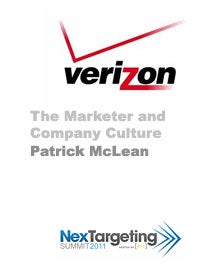 The marketer speaks. And, this time it’s Verizon’s Patrick McLean at today’s NexTargeting event sponsored by at [x+1] in New York City.
The marketer speaks. And, this time it’s Verizon’s Patrick McLean at today’s NexTargeting event sponsored by at [x+1] in New York City.
McLean, who leads Verizon Interactive, which is the digital marketing arm of Verizon, discussed how his marketing group is driving into the digital, data-driven future as well as scrambling over and around his company’s traditional mindset. Culture isn’t just a challenge for agencies or publishers –it’s the same challenge for big, brand marketers, too.
McLean began the discussion with his company’s goal of moving to the “Verizon Digital Brand” and moving sales online. With less than 10% of the company’s phone sales driven through their online portal in 2009, he said that the company hopes to bring that number to 50% by 2012. That seems really fast here, but McLean appeared optimistic and stressed that everyone at his company has bought in.
Like any publisher, his company has a multi-channel strategy that includes both online and offline and the potential for channel conflict is likely a daily challenge such as angry store owner who might say: “Hey I just spent 30 minutes with a guy talking in-store about a new phone and at the end of our discussion he said he’s going to buy it online.” To overcome this, McLean claims that part of any channel’s performance is their ability to drive online -something he called “performance management” and that “every executive is in line with it.” No doubt it’s a challenge to keep track of but given the digital transformation across the competitive set, Verizon has to push forward.
As part of Verizon going digital with its brand, his company says it recognizes the need to change the way the consumer interacts with the company. McLean wants the consumer to move beyond calling Verizon for assistance (the traditional way), and start using its digital channels. In his opinion, the key to this transformation, much like the channel sales strategy is segmentation, personalization and reading the tea leaves of “big data.”
Big brand marketers know that if they can do one-to-one marketing, or the next best thing, the ROI only bets better. McLean indicated that the difference in the cost-of-acquisition online versus other channels was “Hundreds and hundreds of dollars” and for the “Digital Brand” to succeed it needs to go cross-channel too. It may be a counterintuitive notion but if consumers think of Verizon as digital even when interacting offline (in-store, call centers, etc.), they’ll tend to work with them in the digital worlds in the future, which leads to the efficiencies of digital and presumably better profits. Ch-ching.
Given McLean’s presentation, if I’m a Verizon seller, I’d be thinking about how I can become a better digital seller which could mean different things depending on the channel. And, if I’m a web publisher or media company looking to attract Verizon media business, it would appear to be smart to create a plan that points toward online fulfillment and interaction. And, throw in a few “likes” while you’re at it.
McLean detailed in his presentation that the data-driven strategy has been mapped via CRM to the development of the multi-pathed, multi-variate website, specifically. But, he admitted that they’re just getting started with the media side and integrating segmentation and personalization learnings from the website into media.
McLean concluded with the big picture for his company: “For Verizon, for us, this is a culture shift. If you think about the business and people, digital does not come naturally to them. The hope is that once we build these things out, it’s about changing culture. This is what’s going to drive us into a cross-channel opportunity and change the company into a Digital Brand.”
By John Ebbert












